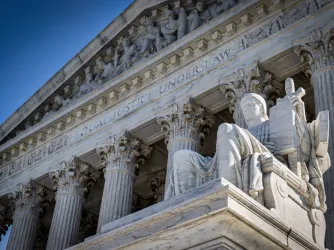Table of Contents
Fursona non grata: Oklahoma lawmaker moves to ban ‘furryism’ in public schools

Kevin Jairaj / USA TODAY Sports
University of Oklahoma Sooners mascot during the game at Gaylord Family-Oklahoma Memorial Stadium. Such a mascot may be prohibited at K-12 public schools if an Oklahoma bill were to become law.
As legislatures across the country begin their sessions each year, FIRE’s legislative team reviews hundreds of bills to identify those that might curtail First Amendment rights. Cue a recently introduced Oklahoma bill that takes aim at an unusual target: furries — essentially, people who dress as anthropomorphized animals. (More on the furry subculture in a minute.) And while elements of the bill, such as getting animal control involved, appear intentionally provocative, banning student expression in this manner is no joke and presents serious constitutional concerns.
First (Furst?) thing’s first. House Bill 3084 bans furries in Oklahoma’s public schools. Specifically, it prohibits public school students who “purport to be an imaginary animal or animal species” or engage in “anthropomorphic behavior commonly referred to as furries” from participating “in school curriculum or activities.” Offending students would need to be picked up by parents or guardians — or animal control services would be contacted to remove the student (really, that’s what the bill says).
What exactly are these furries doing that some feel necessitates a ban? For the uninitiated, Dylan Matthews’ Vox piece explains the furry subculture this way:
“In the broadest sense, a furry is someone with an interest in anthropomorphized animals,” Matthews writes, “that is, animals who have been given human characteristics, like an ability to talk or walk on their hind legs.”
Individuals with this niche interest sometimes express themselves by adopting a “fursona” and wearing an animal costume. These outfits range from the simple — like faux animal ears and a tail — to elaborate, full-body outfits costing thousands of dollars.
FIRE has confidence the Oklahoma legislature will see this bill for what it is, or at least its constitutional issues, and will choose not to infringe on the constitutional rights of its youngest constituents.
Circling back to the Oklahoma ban, the sponsor of this bill cites a debunked story of schools providing litter boxes to furries as the impetus for the legislation. While stories about furries have raised questions and concerns across the country, there is little evidence to indicate widespread problems in schools.
And while dressing up as anthropomorphized animals may be confusing or unsettling to some, it is, as a general proposition, protected by the First Amendment. Attempts to regulate furries’ self-expression, were they seriously advanced, would thus nonetheless face, in primary and secondary education settings, the same constitutional safeguards that have protected student rights at public schools for decades.
In Tinker v. Des Moines Independent Community School District, in which a school sought to ban students from wearing black armbands to protest the Vietnam War, the Supreme Court made clear that symbolic student expression is protected in schools unless reasonably expected to cause a substantial disruption of school activities or invade the rights of others. As FIRE has previously explained, “federal appellate courts have rejected public school efforts to ban clothing depicting guns, drugs, or alcohol absent evidence the clothing did or would cause substantial disruption.” And HB 3084’s furry worry goes much further than clothing, accessories or costumes: It punishes students who “purport” to be an “imaginary animal,” regardless of whether they are dressed as such at school.
It may be easy to dismiss HB 3084 as a stunt, but whatever else it is, it illustrates how legislation instituting absolute, indiscriminate bans on expression one finds objectionable can sweep in expression that is not substantially disruptive, or even that which is commonly accepted or even encouraged in a school setting. If this bill were to become law, a student who wears little or no animal-related apparel but simply states that they are a particular animal would be removed from school. And what of high school mascots — a type of expression typically welcomed by schools? Could they be barred from participating in pep rallies or roaming the sidelines at football games? If HB 3084 were enacted, it may be the end of the line for costumed mascots similar to the Nittany Lion, Big Al, or OU’s very own Boomer and Sooner at public primary and secondary schools in the state of Oklahoma.
FIRE has confidence the Oklahoma legislature will see this bill for what it is, or at least its constitutional issues, and will choose not to infringe on the constitutional rights of its youngest constituents.
Recent Articles
Get the latest free speech news and analysis from FIRE.

The federal charges against Don Lemon raise serious concerns for press freedom

The American people fact-checked their government

California prohibits its teachers from talking about a student's gender identity to their parents. That raises First Amendment concerns.


